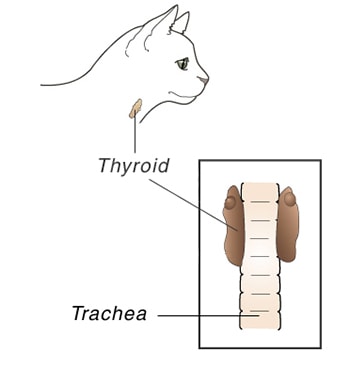The thyroid is made up of two glands located on either side of the windpipe of your cat's neck. It helps to regulate metabolic rate. In some cats, the thyroid becomes overactive which speeds up the metabolism. Hyperthyroidism mainly affects older cats and can occur in either or both of the glands.

The signs vary from cat to cat but most include:
- Weight loss
- Increased appetite
- Hyperactivity and restlessness
- Increased heart rate
- Increased thirst and urination
- Slight increase in body temperature
- Occasional vomiting
- Increased defecation and sometimes diarrhoea
- Panting
- Coat becomes greasy and unkempt
If you notice any of these signs or are at all worried about your cat you should make an appointment to come and see us. Once your cat is diagnosed and treatment is started, they return to normal fairly quickly in most cases. If hyperthyroidism isn't treated it can damage other organs in the body, particularly the heart.
Your older cat should come and see us at least twice a year for a full health check as a lot of changes can occur in six months in an older cat.
Why not come along to one of our FREE Senior Clubs and have a chat to a nurse about caring for your older pet.




